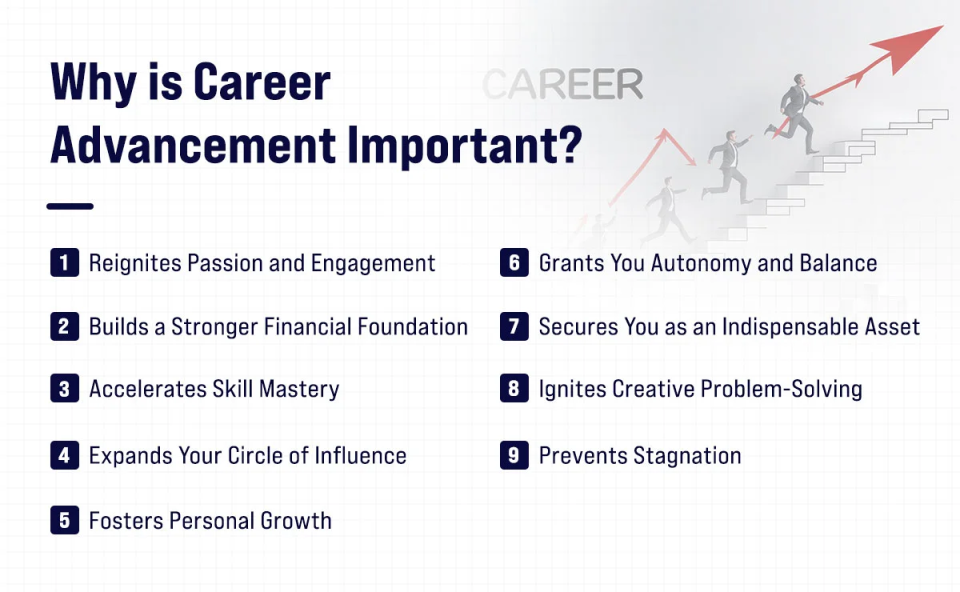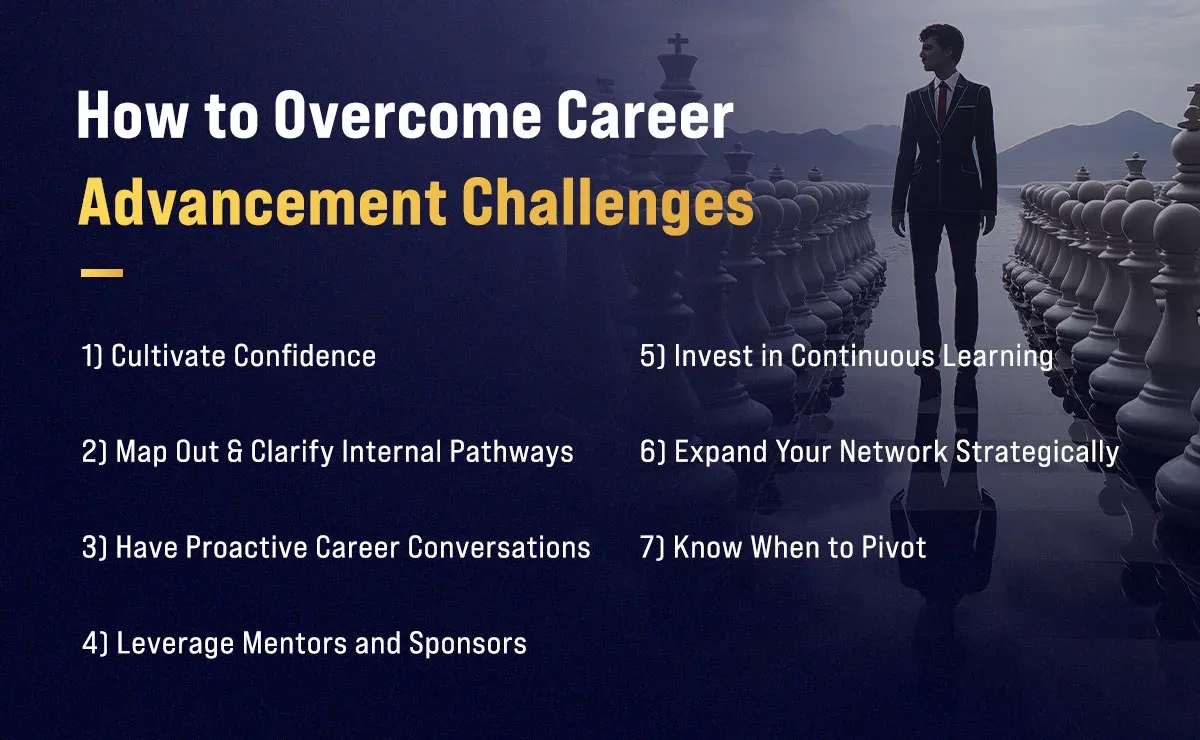What is Career Advancement?

In a typical lifetime, an individual spends approximately 90,000 hours at work. This staggering figure underscores why finding passion and purpose and mapping out a clear plan for career advancement are so vital. Career advancement means upward progression in a profession, marked by skill growth, promotions, leadership roles, increased salary, greater responsibilities, and long-term fulfillment through continuous learning, networking, and strategic career planning.
Whether you’re just starting out in your career, a mid-career professional, or preparing for executive roles, this article explores proven strategies and real‑world insights to help you navigate each stage of your professional development.
Understanding Career Advancement?
Career advancement refers to the upward trajectory of your professional journey—moving from your current role to one with greater responsibility, influence, and reward. Advancement can take multiple forms:
- Promotions & Title Changes: Climbing the organizational ladder (e.g., Associate → Manager → Director).
- Lateral Moves: Transitioning across functions or departments to broaden your expertise (e.g., Marketing → Product Management).
- Specialization: Earning certifications, licenses, or advanced degrees to enter niche, higher-paying roles (e.g., Certified Public Accountant, Doctor of Nursing Practice).
- Entrepreneurial Ventures: Launching your own project, business unit, or startup based on accumulated domain knowledge.
Career advancement might have a different meaning for different individuals, depending on personal values, industry norms, and career aspirations. For some, it might be moving into people management; for others, attaining a high level of technical mastery or launching a side venture could represent true progression. Clearly articulating what “advancement” means to you lays the foundation for a strategic plan and means to achieve it.
Why is Career Advancement Important?
Career advancement is far more than a pathway to higher pay or prestige; it fuels every dimension of your professional and personal life. Here’s why prioritizing upward movement and continual growth matters in the professional world.

1) Reignites Passion and Engagement
Climbing the career ladder isn’t just about a new title but about rediscovering what makes your work meaningful. When you take on fresh responsibilities, you stretch into roles that align more closely with your interests and strengths. This renewed sense of purpose fuels day‑to‑day motivation, turning routine tasks into opportunities to learn and make a tangible impact.
2) Builds a Stronger Financial Foundation
Advancing into higher‑level roles naturally brings better compensation, but the true value lies in long‑term financial resilience. Increased income enables you to save for major life goals like buying a home, funding your children’s education, or building a retirement plan so you can focus on your career without the constant stress of short‑term worries of low compensation.
3) Accelerates Skill Mastery
Every new challenge on your upward path demands fresh upskilling and reskilling, from strategic thinking and people management to technical abilities and leadership skills. By intentionally seeking growth opportunities, you develop a richer, more valuable, and adaptable skill set that not only makes you indispensable in your current role but also arms you for unexpected changes in your industry.
4) Expands Your Circle of Influence
As you move up, you’ll naturally collaborate with senior leaders, external partners, stakeholders, and new teams. These expanded connections don’t just enrich your perspective but also become a springboard for future opportunities. Whether it’s tapping into a mentor’s advice or receiving a referral for a coveted project, your network becomes one of your most valuable assets in your path of growth.
5) Fosters Personal Growth
Advancement isn’t only a professional endeavor; it’s profoundly personal. Tackling bigger projects and leading others builds resilience, sharpens decision‑making, and boosts confidence. Over time, you transform into someone who not only navigates uncertainty with reverence but also actively seeks it out as a catalyst for self‑improvement.
6) Grants You Autonomy and Balance
Higher‑level positions often come with more control over how you allocate your time and resources. With that freedom, you can shape a work schedule that fits your life priorities, which can be anything from giving more time to your family to pursuing other creative decisions or community involvement. Hence, this makes it easier for you to sustain both career momentum and personal well‑being.
7) Secures You as an Indispensable Asset
Employers and organizations prize professionals who continuously invest in their own growth. By proactively advancing your career, you signal to them that you are a committed individual who is adaptable and holds leadership potential. In uncertain times, those qualities make you less replaceable and more likely to weather organizational changes.
8) Ignites Creative Problem‑Solving
Stepping into new roles challenges you to question “how things have always been done” and to seek better solutions. This innovative mindset not only benefits your organization in terms of driving efficiency and growth, but also keeps your own way of working fresh, exciting, and deeply satisfying.
9) Prevents Stagnation
Finally, ongoing advancement is the antidote to professional boredom. By continuously setting and achieving new milestones, you maintain a sense of forward motion which is highly rewarding for you. This dynamic approach ensures that your career remains a captivating journey rather than a static destination.
How to Overcome Career Advancement Challenges
Overcoming the hurdles on your path to advancement requires both self‑awareness and strategic action. Here’s how to turn common roadblocks into stepping‑stones:

1) Cultivate Confidence
- Reframe Self‑Doubt: Treat imposter syndrome as a signal for growth rather than a verdict on your ability. Each time you master a new task, whether that may be leading a small project or completing a certification, you reinforce your self‑belief accordingly.
- Celebrate Small Wins: Maintain a journal where you mention and update each of your successes right from logging positive feedback, project milestones, and client testimonials. Reviewing these entries before big meetings or performance reviews reminds you of your proven track record.
2) Map Out & Clarify Internal Pathways
- Engage HR & Peers: Schedule a casual chat with HR or colleagues who have advanced in their careers to understand unadvertised openings, required competencies, and hidden career programs.
- Audit Organizational Practices: Observe how and when promotions occur, like do they favor internal hires, or do they bring in external talent? Use these insights to tailor your own bid for advancement.
3) Have Proactive Career Conversations
- Set a Dedicated “Growth Meeting”: Rather than waiting for annual reviews, request a mid‑cycle discussion focused solely on your career aspirations. Come prepared with concrete examples of your impact and a draft roadmap of skills you’d like to develop.
- Solicit Clear Feedback: Ask for specific, actionable advice that you can improve on your part. For example, “Which project would best showcase my readiness for a team‑lead role?” and accordingly agree on measurable milestones and timelines.
4) Leverage Mentors and Sponsors
- Mentors: Seek out professionals whose career trajectories inspire you. Their guidance can help you avoid common pitfalls and identify blind spots.
- Sponsors: Cultivate relationships with senior leaders who can actively champion your candidacy for new assignments and promotions. Demonstrate reliability and business impact, so they feel confident advocating on your behalf.
5) Invest in Continuous Learning
- Targeted Skill‑Building: Identify the precise skills, may it be technical, managerial, or strategic, that your next role demands. Enroll in short, focused programs (e.g., leadership workshops, industry certifications) and apply your newfound knowledge immediately through pilot projects to promote experiential learning.
- Micro‑Learning Habits: Incorporate bite‑sized learning into your daily routine. Listen to a 15‑minute podcast on your commute, read an article over lunch, or constantly stay updated on the latest trends in your industry to stay relevant without overwhelming your schedule.
6) Expand Your Network Strategically
- Cross‑Functional Collaboration: Volunteer for projects outside your immediate department to demonstrate versatility and connect with new stakeholders. Such projects often lead to new learnings that increase your desirability as a committed professional.
- External Industry Engagement: Attend conferences, join professional associations, and contribute to thought‑leadership forums. These activities raise your visibility and often uncover unexpected opportunities.
7) Know When to Pivot
- Monitor Progress: If you’ve discussed advancement, met agreed milestones, and still see no movement after 12 months, it may be time to explore roles elsewhere. Conduct discreet informational interviews or reach out to recruiters to understand external interest.
- Plan Your Transition: Use your expanded skill set, documented successes, and network endorsements as leverage when applying for new positions, ensuring your next move is both strategic and empowering.
By systematically addressing each of these challenges—from confidence gaps to unclear pathways—you transform obstacles into catalysts for growth, positioning yourself for the next big step in your career. =
What are Some Career Advancement Opportunities?
Career advancement is not a one‑size‑fits‑all process; it unfolds through a variety of opportunities that let you stretch, specialize, and shine. Here are some high‑leverage paths you can pursue, each drawing on proven strategies and real‑world insights:
- Stepping Into Leadership Roles: Volunteer to lead a small task or cross‑functional project. Even if it’s not a formal promotion, managing budgets, timelines, and teammates showcases your ability to deliver results and positions you for the next official title bump.
- Mastering a Niche Through Certification: Identify the credentials that hiring managers value in your field. Master in‑demand skills, whatever they may be, from data analytics and technical abilities to leadership that directly align with the role you want to break into. A targeted certification signals both expertise and commitment, often translating directly into stepped‑up responsibilities and pay.
- Earning an Advanced Degree: For many industries, especially healthcare, finance, management, and technology, a master’s or doctoral degree often increases your desirability as a professional. For example, an MBA can open doors to strategic leadership pathways, while specialized graduate programs (e.g., Master of Health Administration or Data Science) set you up for roles that blend deep domain knowledge with decision‑making authority.
- Diving into High‑Impact Conferences & Workshops: Beyond the keynote speeches, conferences offer hands‑on labs, roundtables, and networking dinners where you can surface emerging trends, practice cutting‑edge techniques, and forge relationships with thought leaders. Bringing back fresh insights to your team solidifies your reputation as an innovator.
- Rotations and Lateral Moves: If upward slots are scarce, explore horizontal shifts into adjacent functions, for example, moving from operations into product development. This way you’ll gain a broader understanding of the business, build fresh competencies, and make yourself indispensable for future leadership roles that require cross‑department fluency.
FAQs
Q1. What Is the Difference Between Career Development and Career Advancement?
Ans: Career development is a continuous process of enhancing your skills, knowledge, and competencies through learning, training, and experience. It encompasses all activities, right from formal education and mentorship to on‑the‑job training, that prepare you for future roles.
Career advancement, by contrast, is the tangible progression into roles of higher responsibility, status, or compensation. While development fuels advancement, advancement marks the actual stage of transitions (e.g., promotion, role change) that reflect career growth.
Q2. How Do I Ask My Boss About Career Advancement?
Ans: You can take these steps to talk to your boss about your career advancement prospects:
- Schedule a Dedicated Discussion: Request a career-dedicated meeting that is separate from your regular performance review.
- Prepare Evidence of Your Impact: Mention specific examples based on project outcomes, metrics improve, and client testimonials that highlight your impact.
- Share Your Aspirations Clearly: State the role you are targeting or skill set you want to master. E.g.: “I’d like to transition into a team‑lead position within the next 12 months.”
- Ask for a Development Roadmap: “What skills or experiences should I acquire to be ready for this role?”
- Agree on Tangible Milestones & Timeline: Define SMART milestones and regularly set up follow‑up check‑ins to track your progress.
Summing Up
Career advancement is neither accidental nor purely time‑driven. It’s the outcome of intentional goal‑setting, continuous skill development, proactive networking, and strategic execution. Remember, every new responsibility you take on, every connection you forge, and every lesson you learn propels you closer to a more fulfilling, resilient career.
By clarifying what progression means to you, overcoming common challenges, seizing diverse advancement opportunities, and following a structured action plan, you can add growth, fulfillment, and lasting impact to your professional journey.

